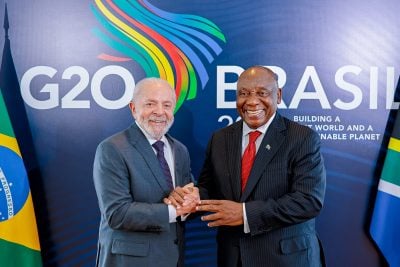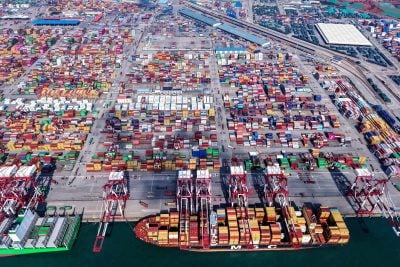Africa remains a compelling growth story. Over the next several decades, Africa’s population will continue to grow rapidly, and Africans will continue to become healthier, wealthier, better educated, more urbanised, more digitally connected, and more productive.
Several studies predict that by the end of this century, 13 of the 20 biggest cities in the world will be in Africa, up from just two today, and so will more than a third of the world’s people.
In the more immediate future, the fortunes of the continent also look bright. According to the African Development Bank’s recently published 2023 African Economic Outlook, Africa is set to be the second-fastest growing region in the world after Asia in 2023-24, demonstrating the resilience of continent’s economy despite having to grapple with multiple global shocks. The report forecasts that Africa will consolidate its post-Covid-19 pandemic recovery to 4.3% GDP growth in 2024 from 3.8% in 2022.
Standard Bank, Africa’s largest bank by assets, and the leading financial sector player in US-Africa trade corridor has an optimistic view on the future of our continent. We strongly believe that Africa’s potential can be further enhanced by forging deeper international partnerships and attracting more international investment.
That is the message that Standard Bank took to the Corporate Council on Africa (CCA) US-Africa Business Summit, which took place between 11 and 14 July 2023 in Gaborone, Botswana. The four-day summit, under the theme of “Enhancing Africa’s value in global value chains”, offered African business leaders exciting opportunities to cement older links and to develop new ties with the world’s most powerful market.
The Botswana summit follows on from President Biden’s US-Africa Leaders Summit in Washington DC at the close of 2022, in which Standard Bank was also an active participant and where our $80m partnership with GE Healthcare for diagnostic medical equipment for the African health sector was announced.
Forging international trade partnerships
The Botswana summit came as trade ties between the US and Africa continue to strengthen. Since 2021, the US government has helped close more than 800 two-way trade and investment deals across 47 African countries for a total estimated value of over $18bn, and the US private sector has closed investment deals in Africa valued at $8.6bn. US goods and services traded with Africa totalled $83.6bn in 2021. Since January 2021, the Biden Administration has invested and plans to invest more than $1bn in trade, investment, and economic development in Africa.
The US government is also a firm supporter of the African Continental Free Trade Area (AfCFTA). AfCFTA, to which 54 African countries are signatories, signals a commitment towards freer trade and, ultimately, an African common market. The overall mandate of the AfCFTA is to create a single continental market with a population of about 1.3bn people and a combined GDP of approximately $3.4 trillion.
The AfCFTA will contribute to establishing regional value chains in Africa, enabling investment and job creation. A World Bank report estimates that effective implementation of the AfCFTA has the potential to raise 30m Africans out of severe poverty and increase the earnings of almost 68m other people living on less than $5.50 per day. Most impressive of all, the AfCFTA would facilitate a doubling of intra-African trade by 2035.
Three ways to achieve goals of AfCFTA
Standard Bank also firmly supports AfCFTA and has three suggestions to make sure that this bold plan achieves its goals.
First, from the perspective of a pan-African financial services business, it would be extremely helpful if the AfCFTA could create a legal framework that would give equal comfort to both country authorities and investors about property in the form of data. The Standard Bank Group, for example, would often like to process transactions in the cloud, while country authorities often prefer processing to take place within their jurisdictions. Both preferences are, of course, legitimate. Naturally, jurisdictions want to protect their citizens and to retain monetary sovereignty. A harmonised African legal framework for cloud processing could achieve all of these objectives.
Our second suggestion is about the protection of dividend outflows. The AfCFTA investment protocol’s commitment to free transfer of funds is very helpful in this regard – but the next frontiers would include more transparent and predictable tax treatment, and a similarly transparent and consistent approach to access hard currencies for foreign investors. Nigeria’s recent reform of its foreign exchange market is a major – and very welcome – step in the right direction.
Lastly, the largest constraints to African trade – and African development in general – are the severe shortages of transport and energy infrastructure, which Standard Bank’s experts value at more than $3.4bn. Closing this gap will require a combination of public, private and international funding, and multiple approaches, including public-private partnerships and a willingness to make use of Africa’s “brown” and transitional natural resources in our own interests, and to support our own development.
In the near future, we commit to playing our part in managing and mitigating climate change, and in a just transition away from reliance on carbon-based energy. But this must be at a pace that makes sense for the people of Africa, and that acknowledges our right to follow our own path to economic and social development.
In conclusion, we reiterate our support for the AfCFTA and believe that its effective implementation, through forging international trade partners, will bring prosperity to many Africans. We are excited about our continent’s compelling story of hope and resilience towards a better future.
Want to continue reading? Subscribe today.
You've read all your free articles for this month! Subscribe now to enjoy full access to our content.
Digital Monthly
£8.00 / month
Receive full unlimited access to our articles, opinions, podcasts and more.
Digital Yearly
£70.00 / year
Our best value offer - save £26 and gain access to all of our digital content for an entire year!

 Sign in with Google
Sign in with Google 



